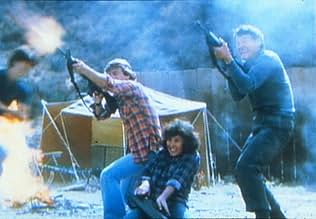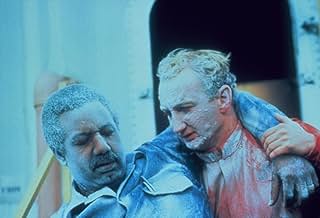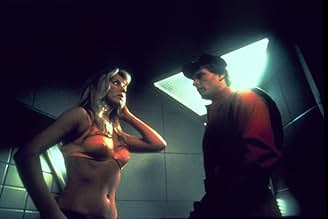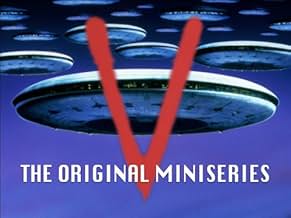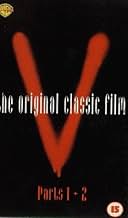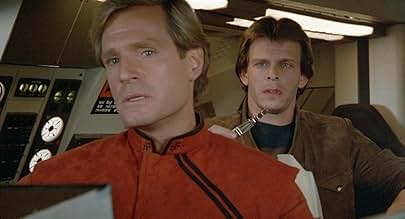Quando alienígenas vêm à Terra para pedir nossa ajuda, alguns humanos desconfiados descobrem suas horríveis e verdadeiras intenções e se preparam para resistir.Quando alienígenas vêm à Terra para pedir nossa ajuda, alguns humanos desconfiados descobrem suas horríveis e verdadeiras intenções e se preparam para resistir.Quando alienígenas vêm à Terra para pedir nossa ajuda, alguns humanos desconfiados descobrem suas horríveis e verdadeiras intenções e se preparam para resistir.
- Indicado para 2 Primetime Emmys
- 1 vitória e 4 indicações no total
Explorar episódios
Enredo
Você sabia?
- CuriosidadesThe series was intended as a literal retelling of the Nazi takeover of various countries, and the resistance movement against them. However, because of the popularity of the "Star Wars" saga and other science fiction hits, as well as the belief among network executives that U.S. citizens would not believe a fascist takeover, the network executives had the producers change it to a science fiction miniseries. Other ideas were also discussed, but discarded.
- Erros de gravaçãoIn the shuttle right after Mike escapes with Robin from the mothership, Mike loops the shuttle, and there is shot of them upside-down. Robin raises her arms, apparently to keep from falling out of her seat, but the entire time her hair rests on her shoulders as if right-side up.
- Citações
Mike Donovan: How'd someone like that get to be your leader anyway?
Martin: Charisma. Circumstances, promises... Not enough of us spoke out to question him until it was too late. It happens on your planet, doesn't it?
- Cenas durante ou pós-créditosTo the heroism of the Resistance Fighters --past, present, and future-- this work is respectfully dedicated
- ConexõesEdited into Armageddon in Effect (2008)
- Trilhas sonorasTheme
(credited)
from Star Wars: Episódio IV - Uma Nova Esperança (1977)
Composed by John Williams
© 1977 Lucasfilm Ltd.
Avaliação em destaque
If a ninety-nine out of a hundred science fiction films fall into being cliché ridden, one will stand out above the rest. V, in its original miniseries, would be one of those that stands above the rest. V is anything but your typical science fiction story of an alien invasion. It is a tale of a fascist (alien) takeover of our society and the resistance of a few in a society to it. As a result V, while a product of the technology and culture of the 1980's, is a timeless piece of science fiction.
One of the elements to V's success is its cast. Leading, so to speak, the cast of human characters are Marc Singer as cameraman Mike Donovan and Faye Grant as med-student turned rebel leader Julie Parrish. Both Singer and Grant give nice performances that, for the most part, come across as real people in extraordinary situations. In fact the performances of the entire cast be described by that last phrase as well ranging from the Maxwell family (Michael Durrell, Penelope Windust as the parents with Blair Tefkin, Viveka Davis and Marin May as their daughters) who find themselves persecuted to the point of joining the resistance much like the Taylor family (Jason Bernard, Richard Lawson and Michael Wright) to the Bernstein family (George Morfogen, Bonnie Bartlett) who find themselves torn between their Visitor friendly son Daniel (David Packer) and the Holocaust survivor grandfather Abraham (Leonardo Cimino). In fact the single best scene involves Abraham, who is wanting to hide the persecuted Maxwell's, reminding his son that this whole situation is all too familiar for the consequences of them not being hidden means "we haven't learned a thing". This is a scene that is not only well acted and well written but incredibly rare in your average science fiction story as well. There's also many other fine members of the cast including Neva Patterson (Donovan's mom), Evan Kim (Donovan's camera partner Tony), Jenny Sullivan (reporter turned Visitor spokeswoman Kristine Walsh) and Kristine Walsh (as Gardener turned rebel Sancho) amongst many others. The human side of the cast is just the tip of the iceberg though.
There's also a fine cast playing the alien "visitors" as well. They range from their seemingly benevolent leader John (played briefly and well by Richard Herd) to Andrew Prine as the authoritative Steven. Then there's the innocent abroad in the form of Robert Englund as Willie and the resistance from within the visitors themselves in the form of Frank Ashmore as Martin and Jenny Neumann as Barbara. Then there is Jane Badler as Diana, perhaps the most attractive and conniving of the alien visitors, who plays the role with a seriousness not usually found in this kind of role. Together they form one of the best, and definitely one of the most diverse, cast of alien invaders ever assembled.
V is also aided by fine work behind the camera. There's the cinematography of John McPherson especially the tracking shot of characters watching the first contact sequence and the scenes in the mother-ship. The production design in the form of the mother ship interiors are fine examples of science fiction sets. There's also the special effects work ranging from the excellent shots of mother-ships (a decade plus before Independence Day) to the aerial dogfight at the end which all work marvelously for the most part despite a very few shots which don't look quite finished. No review of V is complete without mentioned the fine prosthetic work of the miniseries which range from the Visitors true faces to some rather uncomfortable dining sequences. Last, but not least by any means, is the fine score by composer Joe Harnell which takes puts together classical music influences and choir in one of the most unusual and best scores produced for any science fiction television piece I have heard, especially for the opening and closing credits of any part. In short: strong production values go a long way.
To my mind V's ultimate success lies in the script and direction of Kenneth Johnson. V was originally conceived not as a science fiction tale of alien invasion but as the tale of a fascist takeover of the U.S which can still be found deeply embedded in the final product. In fact that is what separates V from many other alien invasion stories. V is about fascism, how people can be lured in by it, how far those in power will go to secure their position, how the average person will react and what happens when ordinary people stand up to resist it. There's also more then a few hints of Nazi Germany as well from the Swastika-like symbol of the Visitors to Friends of the Visitors youth groups (the Hitler Youth) and, before the miniseries is over with, a strong allegory with the Holocaust as well (see the miniseries to get it). Wisely Johnson also puts a fair (but not gratitude) amount of action in as well which helps to compliment the story and move it along. V is embedded in the technology and culture of the 1980's when it was made to sure but that doesn't date the story at all. Instead V becomes, like H.G. Welles War of the Worlds before it, a timeless tale of alien invasion and human resistance to it.
What makes V successful? Well it's large cast of fine actors, nice cinematography, good special effects work, excellent prosthetic work and fine score go along way. Yet the true success of V lies in its script and story. Why? Because ultimately V is not about spaceships and ray-guns but is about people and their reactions to the extraordinary events around them.
One of the elements to V's success is its cast. Leading, so to speak, the cast of human characters are Marc Singer as cameraman Mike Donovan and Faye Grant as med-student turned rebel leader Julie Parrish. Both Singer and Grant give nice performances that, for the most part, come across as real people in extraordinary situations. In fact the performances of the entire cast be described by that last phrase as well ranging from the Maxwell family (Michael Durrell, Penelope Windust as the parents with Blair Tefkin, Viveka Davis and Marin May as their daughters) who find themselves persecuted to the point of joining the resistance much like the Taylor family (Jason Bernard, Richard Lawson and Michael Wright) to the Bernstein family (George Morfogen, Bonnie Bartlett) who find themselves torn between their Visitor friendly son Daniel (David Packer) and the Holocaust survivor grandfather Abraham (Leonardo Cimino). In fact the single best scene involves Abraham, who is wanting to hide the persecuted Maxwell's, reminding his son that this whole situation is all too familiar for the consequences of them not being hidden means "we haven't learned a thing". This is a scene that is not only well acted and well written but incredibly rare in your average science fiction story as well. There's also many other fine members of the cast including Neva Patterson (Donovan's mom), Evan Kim (Donovan's camera partner Tony), Jenny Sullivan (reporter turned Visitor spokeswoman Kristine Walsh) and Kristine Walsh (as Gardener turned rebel Sancho) amongst many others. The human side of the cast is just the tip of the iceberg though.
There's also a fine cast playing the alien "visitors" as well. They range from their seemingly benevolent leader John (played briefly and well by Richard Herd) to Andrew Prine as the authoritative Steven. Then there's the innocent abroad in the form of Robert Englund as Willie and the resistance from within the visitors themselves in the form of Frank Ashmore as Martin and Jenny Neumann as Barbara. Then there is Jane Badler as Diana, perhaps the most attractive and conniving of the alien visitors, who plays the role with a seriousness not usually found in this kind of role. Together they form one of the best, and definitely one of the most diverse, cast of alien invaders ever assembled.
V is also aided by fine work behind the camera. There's the cinematography of John McPherson especially the tracking shot of characters watching the first contact sequence and the scenes in the mother-ship. The production design in the form of the mother ship interiors are fine examples of science fiction sets. There's also the special effects work ranging from the excellent shots of mother-ships (a decade plus before Independence Day) to the aerial dogfight at the end which all work marvelously for the most part despite a very few shots which don't look quite finished. No review of V is complete without mentioned the fine prosthetic work of the miniseries which range from the Visitors true faces to some rather uncomfortable dining sequences. Last, but not least by any means, is the fine score by composer Joe Harnell which takes puts together classical music influences and choir in one of the most unusual and best scores produced for any science fiction television piece I have heard, especially for the opening and closing credits of any part. In short: strong production values go a long way.
To my mind V's ultimate success lies in the script and direction of Kenneth Johnson. V was originally conceived not as a science fiction tale of alien invasion but as the tale of a fascist takeover of the U.S which can still be found deeply embedded in the final product. In fact that is what separates V from many other alien invasion stories. V is about fascism, how people can be lured in by it, how far those in power will go to secure their position, how the average person will react and what happens when ordinary people stand up to resist it. There's also more then a few hints of Nazi Germany as well from the Swastika-like symbol of the Visitors to Friends of the Visitors youth groups (the Hitler Youth) and, before the miniseries is over with, a strong allegory with the Holocaust as well (see the miniseries to get it). Wisely Johnson also puts a fair (but not gratitude) amount of action in as well which helps to compliment the story and move it along. V is embedded in the technology and culture of the 1980's when it was made to sure but that doesn't date the story at all. Instead V becomes, like H.G. Welles War of the Worlds before it, a timeless tale of alien invasion and human resistance to it.
What makes V successful? Well it's large cast of fine actors, nice cinematography, good special effects work, excellent prosthetic work and fine score go along way. Yet the true success of V lies in its script and story. Why? Because ultimately V is not about spaceships and ray-guns but is about people and their reactions to the extraordinary events around them.
- timdalton007
- 10 de nov. de 2009
- Link permanente
Principais escolhas
Faça login para avaliar e ver a lista de recomendações personalizadas
Detalhes
- Data de lançamento
- País de origem
- Idioma
- Também conhecido como
- Os Extraterrestres no Planeta Terra
- Locações de filme
- Empresas de produção
- Consulte mais créditos da empresa na IMDbPro
Contribua para esta página
Sugerir uma alteração ou adicionar conteúdo ausente


